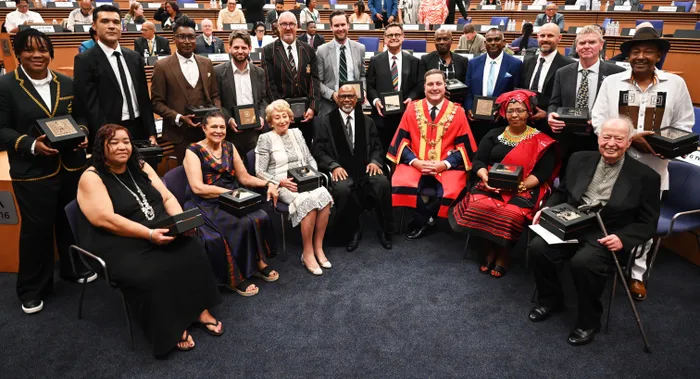Capetonians celebrated at the City’s civic awards ceremony

Mayor Geordin Hill-Lewis, with signatories of the Civic Honours Book Proteas cricket captain Temba Bavuma, pictured is his Phola Bavuma, who accepted on his behalf, alongside award-winning filmmaker Oliver Hermanus, and City of Cape Town manager Lungelo Mbandazayo.
Image: Supplied
Capetonian luminaries, who make a difference in their communities with their craft, expertise, professionalism, and talent, were acknowledged at the City of Cape Town's civic honours ceremony.
The council ceremony, to promote civic pride, was held in chambers at the civic centre on Friday, November 14.
The highest honour, the Freedom of the City, will be presented in January 2026 to David Kramer and the late Taliep Petersen, recognising their exceptional contributions.
Mayor Geordin Hill-Lewis said the awards recognised some outstanding individuals, "you make us proud and give us hope".
"We also say thank you to every Capetonian who may not be in the council chamber this morning, but who play their part in making our city great, and making life better for those around them," he said.
From the gallery, Beryl Hermanus, formerly from Plumstead, shouted: "That's my boy", as her son Oliver, one of South Africa's most acclaimed and internationally recognised film-makers, received the second-highest honour, by signing the Civic Honours Book, for exceptional meritorious public service.
Born and raised in the southern suburbs, Mr Hermanus said it was a very proud moment for him.
"My mother and father are from Cape Town. My mother's from Athlone. I need to be here today so that I can celebrate my family's lives in Cape Town and our relationship with the city, that is who I am," he said.
Mr Hermanus completed a Bachelor of Arts Degree at the University of Cape Town before receiving a scholarship to attend the London Film School.
He received this award alongside Jacques Kallis, in absentia, who was born in Pinelands and attended Wynberg Boys' High School and is unmatched as an all-rounder in Test cricket.
He also received it alongside Temba Bavuma, who went from playing cricket on the streets of Langa to becoming an international cricket captain and one of South Africa's significant cricket figures.
Tony Leon was also recognised. He moved to Cape Town in 1999 as leader of the opposition and is a politician, diplomat, author, and public intellectual.
Good Party deputy secretary-general and councillor Suzette Little announced that they were walking out of the chamber ahead of Mr Leon's award being presented. They were joined by Shameemah Salie, spokeswoman for Al Jama-ah and a proportional representation (PR) councillor, and other political parties.
In a statement, Ms Little says that the gesture felt completely disconnected from the daily realities of violence, poverty, and instability.
"While our democracy is grounded in a constitution that promises social justice and economic transformation, Leon has been a vocal and party political opponent of our country’s transformation policies," she said.
Ms Salie said knowing that the DA, formerly headed by Mr Leon, was supporting Israel did not sit well with her.
"The genocide in Palestine continues," she said.

Recipients of Mayor’s Medals in the City of Cape Town council chambers.
Image: Supplied
The prestigious Mayor’s Medal recognised outstanding contributions across fields like recreation and sport, including Babalwa Latsha, one of South Africa's most accomplished female rugby players, who was born in Khayelitsha; and posthumously, Bernard Hartze, also known as "Dancing Shoes", was a South African football legend.
In the same category, Hamilton Sea Point Rugby football club, the country's oldest rugby club, founded on March 14, 1875, was acknowledged for being a symbol of sporting excellence.
In the cultural affairs category, Basil Appolis, a multi-award-winning actor, director, producer, and writer, a UCT graduate, was recognised, along with Emo Adams, raised in Mitchell's Plain, one of Cape Town's most beloved entertainers and cultural ambassadors, and Denise Newman, raised in Athlone, Cape Town's most accomplished and versatile performing artists.
Similarly, Louis Heyneman was acknowledged for his work in music, arts, and journalism in Cape Town and beyond. Sylvia Mdunyelwa, born in Langa, was acknowledged posthumously for her contribution to South African jazz.
In economic affairs, Professor Brian Kantor, an economist, educator, and public intellectual, has maintained a lifelong connection to Cape Town while achieving international recognition for his insights.
In the community affairs category, Professor Brian O'Connell was honoured posthumously. He was a leader at the University of the Western Cape and played a role in strengthening the institution at a time of uncertainty as rector and vice-chancellor from 2001 until 2014, he said.
Wendy Ackerman, one of Cape Town's most significant philanthropists and business leaders, was also acknowledged in the community affairs category.
Victor Pick, who had been involved in the research and experimental aspects of cardio-thoracic surgery alongside Professor Christiaan Barnard, received the medal posthumously in the social affairs and services category.
The Service Dining Rooms, in Canterbury Street, feeding Cape Town's most vulnerable with nutritious cooked meals, and The Haven Night Shelter, as a beacon of hope and dignity, were recognised in the social affairs and services recipients.
The Two Oceans Aquarium received a mayor's medal for their marine conservation excellence, along with Dr Joan Parker, for being the driving force behind the transformation of the upper Liesbeeck River Garden, and Friends of the Liesbeeck, who showed exceptional commitment to environmental conservation.
The Mountain Club of South Africa received a medal for its extraordinary bravery in longstanding voluntary service to the people of Cape Town.